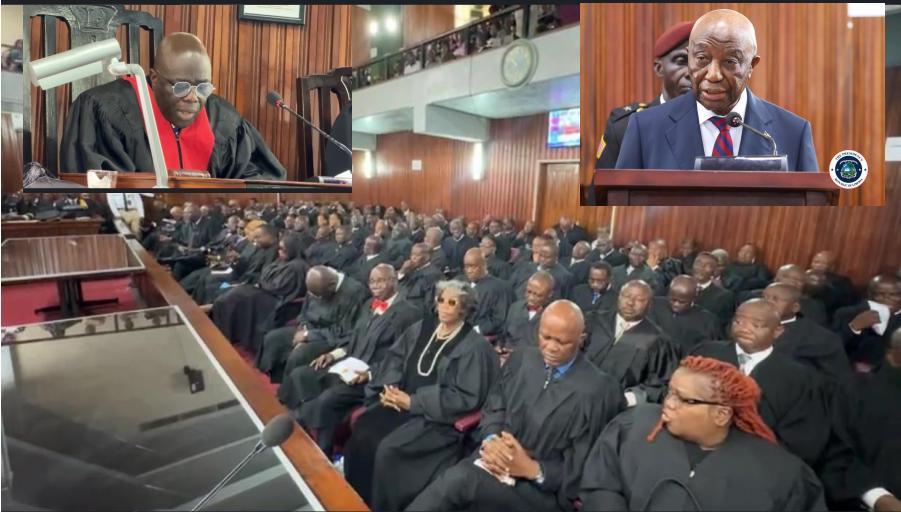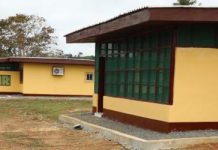Africa-Press – Liberia. President Joseph Nyuma Boakai, Sr. has renewed his administration’s commitment to judicial reform, independence, and integrity as the Supreme Court of Liberia officially opened its October Term on Monday, October 13.
Speaking at the Temple of Justice before an audience of justices, lawmakers, diplomats, and legal professionals, President Boakai emphasized the central role of the Judiciary in upholding democracy, restoring public trust, and driving national development.
He used the occasion to congratulate the new Chief Justice, His Honor Yamie Quiqui Gbeisay, and Associate Justice Boakai N. Kanneh, both of whom he praised for their commitment to reform and their potential to revitalize the nation’s legal system.
“This occasion signifies not just the start of a new court term, but also the renewal of public trust in one of the three equal branches of our government,” President Boakai said.
“On behalf of the Government and People of Liberia, I extend heartfelt congratulations to His Honor Yamie Quiqui Gbeisay, the Chief Justice, as he assumes the highest judicial office in our Republic.”
President Boakai expressed confidence in Chief Justice Gbeisay’s vision to modernize the Judiciary, decentralize access to justice, and strengthen institutional integrity.
A New Chapter for the Judiciary
Justice Gbeisay replaces retired Chief Justice Sie-A-Nyene Gyapay Youh, while Associate Justice Kanneh fills a vacant seat on the Bench.
The President hailed both appointments as symbolic of national renewal, stressing that a stronger, more responsive judiciary is essential to Liberia’s long-term peace and prosperity.
“The inclusion of Justice Kanneh brings new energy, experience, and perspective to the Bench,” President Boakai stated.
“His inclusion is both symbolic and substantive, representing the renewal of the Judiciary and the continued effort to strengthen its integrity, balance, and independence.”
Justice as a Cornerstone of National Development
President Boakai underscored the connection between justice and development, noting that Liberia’s ARREST Agenda for Inclusive Development identifies the Rule of Law as one of its core pillars.
“A nation cannot progress where laws are ignored, where contracts are broken, or where the weak have no recourse,” he said.
“Investors will come only where processes are predictable, the law is clear and respected, and citizens will obey laws that are fair and consistently enforced.”
He acknowledged citizens’ concerns over delays in the judicial process and perceptions of bias, and called for urgent reforms to improve transparency, fairness, and efficiency in the courts.
His administration, he affirmed, will support better working conditions for judicial officers, including training, logistics, and infrastructure upgrades.
A Call to Integrity
Addressing the judiciary directly, President Boakai urged justices, judges, and magistrates to “wear their robes,” not as symbols of privilege, but of public service.
“Let your judgments be guided by truth and conscience, and let every decision you make strengthen the people’s trust in our courts.”
He also encouraged lawyers and court officers to maintain high ethical standards and professional conduct, reminding them that they are the “lifeblood of justice.”
President Boakai further maintained,
“Justice begins with how we treat each other. Let us all uphold fairness and compassion in our daily lives, for justice is not only a matter for the courts, but a culture for the people.”
Chief Justice Gbeisay Lays Out Bold Reform Agenda
In his first formal address as head of the nation’s highest court, Chief Justice Yamie Quiqui Gbeisay echoed the President’s calls for reform, declaring that the judiciary must seize the moment to restore credibility, improve case management, and battle corruption.
“The reform of the judiciary is a national concern and should be treated as a national priority,” Chief Justice Gbeisay declared.
He announced immediate actions already taken to address long-standing inefficiencies in the system, including the restructuring of courtroom spaces in the Commercial and Criminal Courts in Montserrado County to speed up trials and reduce case backlog.
He revealed that the Commercial Court, with three judges, had only one functioning courtroom.
The court has now been split into two working divisions to allow two judges to preside concurrently.
The court currently holds just 36 cases, an amount he expects to be quickly resolved with the new structure.
More critically, he addressed the issue of prolonged pre-trial detention in Criminal Court
“E”, where 190 accused persons remain incarcerated awaiting trial for sexual offenses, some for up to ten years.
“While rape is a serious offense, prolonged pretrial detention of unconvicted persons borders on fundamental human rights,” he warned.
“What happens if they are later found to be innocent? They would have been punished for crimes they did not commit.”
As a remedy, he has also ordered the partitioning of Criminal Court “E” to enable two judges to hear cases simultaneously and reduce overcrowding. Similar actions are being considered for Criminal Court “D”, which holds over 219 pretrial detainees.
Addressing Prison Overcrowding and Access to Justice
Chief Justice Gbeisay reported ongoing consultations with the Ministry of Justice to address the overcrowding of the Monrovia Central Prison, which currently holds over 1,350 inmates, well beyond its capacity.
He stressed that prison infrastructure is part of national development and should be prioritized accordingly.
“A magistrate cannot be blamed for bribery if they refuse to remand a violent criminal due to overcrowding, and yet be blamed if they send the person to jail,” he said.
Major Anti-Corruption and Personnel Reforms Underway
In an effort to restore public trust, Chief Justice Gbeisay unveiled the launch of the Judicial Monitoring, Evaluation, and Accountability Unit (JME&ACD).
This division will serve as a watchdog, monitoring judicial performance, staff conduct, and financial accountability.
“The JME&ACD will act as a powerful judicial police,” he stated.
“Corruption must go, or corrupt people must go!”
The Chief Justice also disclosed that a personnel and credential audit conducted by the Civil Service Agency uncovered major salary disparities, ghost workers, and unqualified staff across the judiciary.
“Some judiciary staff with lower qualifications were earning far more than their supervisors. That ends under my watch,” he said.
He also announced that staff beyond retirement age will be retired by December 31, and warned judges and magistrates who have not declared their assets to do so within 30 days, or face disciplinary actions.
To improve specialised justice services, the Judiciary is drafting a bill for the establishment of a Family and Children’s Court, which will consolidate legal matters involving custody, child support, adoption, and divorce under one competent legal framework.
Gbeisay also commended the Liberian Law School, a new institution aimed at expanding access to legal education and reducing the burden on the Louis Arthur Grimes School of Law.
He celebrated the Liberia School of Law’s recent victory at the ECOWAS Moot Court competition in Côte d’Ivoire.
“This is a victory not only for the Liberian Law School but for the legal profession in Liberia as a whole,” he said.
In his address, Chief Justice Gbeisay expressed hope that Liberia will soon have a modern Supreme Court complex, and called on President Boakai to make that vision a key legacy of his presidency.
“We hope and pray that a modern Supreme Court will become part of your legacy before 2029,” Gbeisay said.
He also assured the public of his commitment to discipline, accountability, and professionalism within the judiciary.
“We have not done enough, so we need not say much,” he remarked.
“The October 2025 Term of Court is hereby declared open.”
As Liberia’s Judiciary embarks on what both the President and Chief Justice described as a “new chapter,” the message was clear: justice reform is not only a necessity, it is a national imperative.
For More News And Analysis About Liberia Follow Africa-Press






